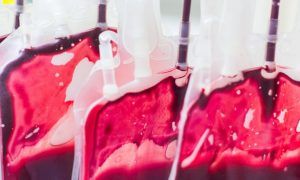Sarah Ditum in The Guardian:
 Nine pints, give or take. That’s how much blood you have, surging in time to “the old brag”, as Sylvia Plath put it, of your heart. Although for Rose George in the opening scene of this book, it’s eight, since she introduces herself in the act of giving one pint to the NHS Blood and Transplant service. Ten minutes lying back hooked up to a bag, then eat a biscuit and go on your way. “The reality of it, that I am emitting a bodily fluid in public, is contained as much as possible,” she writes, “and not just in clear plastic bags.” The ordinary act of giving blood is an astonishing one. But then blood is an astonishing and contradictory substance. It’s immensely valuable – although voluntary donation is the gold standard for safety, people worldwide routinely sell the contents of their veins. Yet for centuries, medicine was merrily letting it by the bowlful as a “cure” for every imaginable ailment. This passion for bleeding took lives: if the first bleed wasn’t effective, another was ordered. Bleeding was even recommended as a cure for bleeding. How absurd this all seems. But, as George reminds us, received medical wisdom can age fast and badly. Leeches were once so prized for bloodletting that they could help to make fortunes, until the craze finally faded in the 19th century, and leeching became a byword for quackery. Yet they are now back at the bleeding edge of surgical technology: medics have found that there is no tool so precise as these vampiric worms for removing the dangerous reservoirs of blood that can build up in reattached body parts.
Nine pints, give or take. That’s how much blood you have, surging in time to “the old brag”, as Sylvia Plath put it, of your heart. Although for Rose George in the opening scene of this book, it’s eight, since she introduces herself in the act of giving one pint to the NHS Blood and Transplant service. Ten minutes lying back hooked up to a bag, then eat a biscuit and go on your way. “The reality of it, that I am emitting a bodily fluid in public, is contained as much as possible,” she writes, “and not just in clear plastic bags.” The ordinary act of giving blood is an astonishing one. But then blood is an astonishing and contradictory substance. It’s immensely valuable – although voluntary donation is the gold standard for safety, people worldwide routinely sell the contents of their veins. Yet for centuries, medicine was merrily letting it by the bowlful as a “cure” for every imaginable ailment. This passion for bleeding took lives: if the first bleed wasn’t effective, another was ordered. Bleeding was even recommended as a cure for bleeding. How absurd this all seems. But, as George reminds us, received medical wisdom can age fast and badly. Leeches were once so prized for bloodletting that they could help to make fortunes, until the craze finally faded in the 19th century, and leeching became a byword for quackery. Yet they are now back at the bleeding edge of surgical technology: medics have found that there is no tool so precise as these vampiric worms for removing the dangerous reservoirs of blood that can build up in reattached body parts.
Blood can be a sensationally effective medical treatment, but also a vector for destructive diseases. George has travelled widely for the book, and reports from Delhi and Nepal, Canada and Cape Town. In the last, she meets the victims of South Africa’s horrifying HIV/Aids crisis – which was partly human made. While in other nations prevention and treatment have led to the decline of HIV/Aids, in South Africa government promotion of quack treatments from 1999 to 2008 means the virus is still proliferating, aided by obliging human behaviour. George’s journalistic eye is combined with sharp moral judgment. At a time when agencies such as Amnesty have decided that the best way to fight HIV/Aids is by liberalising the sex trade, she is bracingly clear that the sugar daddy economy of South Africa (older men called “blessers” who shower school-age girls called “blessees” with gifts in exchange for usually unprotected sex) is both a public health hazard and an ethical atrocity. “Blesser, blessee: these are new names for something that exists anywhere a young woman exchanges her body for something, but that something is never power.”
More here.
